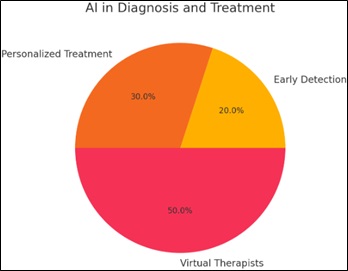The Intersection of AI and Mental Health: A Review of Advances, Ethics, and Impact
Keywords:
Artificial Intelligence (AI), Technological Advances, Impact Assessment, AI in Healthcare, Personalized Therapies.Abstract
The integration of Artificial Intelligence (AI) into mental healthcare represents a transformative shift in addressing mental health as a critical component of overall well-being. As mental health disorders like depression and anxiety become leading contributors to global disability and economic loss, traditional care models struggle to keep pace with the increasing demand for accessible and scalable services. AI offers the potential to revolutionize mental health care through advanced detection techniques, personalized therapies, and virtual therapeutic platforms, thereby expanding access and reducing stigma. This narrative review systematically explores the ethical considerations of AI in mental health interventions. A comprehensive literature search across multiple academic databases identified 51 relevant studies, which were analyzed to understand key ethical concerns and the integration of ethical principles into AI development. The review highlights the evolution of AI in mental healthcare, from early symbolic AI to advanced applications like virtual therapists and emotion-tracking tools. The findings underscore AI's role in enhancing early detection, personalizing treatment, and supporting continuous monitoring. However, the integration of AI in mental health care raises significant ethical and regulatory challenges, including privacy concerns, bias, and the preservation of human empathy in therapy. Effective regulation and ongoing research are essential to address these challenges and ensure that AI technologies improve rather than compromise care quality. In conclusion, while AI holds promise for transforming mental health care by making it more accessible and personalized, balancing innovation with ethical responsibility is crucial. The future of AI in mental health will depend on developing robust regulatory frameworks, ensuring transparency and validation of AI models, and maintaining a focus on ethical standards to foster equitable and effective mental health services.








